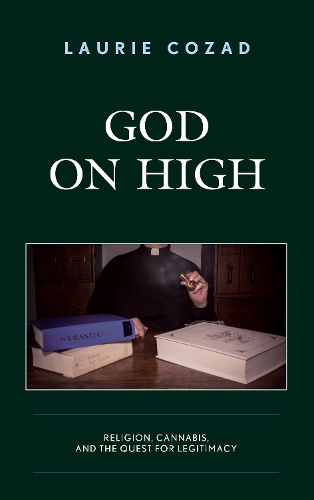
God on High: Religion, Cannabis, and the Quest for Legitimacy
(Hardback)
Publishing Details
God on High: Religion, Cannabis, and the Quest for Legitimacy
By (Author) Laurie Cozad
Bloomsbury Publishing PLC
Lexington Books
20th June 2018
United States
Classifications
Professional and Scholarly
Non Fiction
Police and security services
Religious institutions and organizations
Spirituality and religious experience
206.5
Physical Properties
Hardback
190
Width 157mm, Height 239mm, Spine 19mm
426g
Description
God on High examines cannabis-based religious groups in Canada and the United States. These religious groups are on the rise as cannabis use is further decriminalized or legalized. In examining these groups, Laurie Cozad explores the triangular relationships between cannabis, religion, and the law, and the ways in which the shifting discourse of medical science impacts this trio.
Reviews
In an era where atheists seem to get more air time than theists, it's delightful to see a scholarly work approach the delicate interplay between cannabis and religion. Here is a thorough, informative, readable look at a complex history that's bound to surprise even the most informed scholars and entertain everyone. I promise that any reader will have at least one myth disputed and finish the book thinking about religious freedom, cannabis, and society in a whole new way. It's not just for fans of the plant or theologians; anyone who cares about our rights should read this book. -- Mitch Earleywine, University at Albany
Laurie Cozad here offers a well-argued and thoughtfully articulated theorization of cannabis religious movements. Cozad contends for a contextual approach to understanding the genealogy of these traditions, pressing us to see these movements as deeply rooted in enduring human spiritual practices and needs. As well, her analysis reveals something of the larger social prejudice against and ostracization of these groups: the deployment of an illegal or disparaged substance has been used to cast doubt on the authenticity and therefore validity of deeply rooted human rituals and the communities which are called into being through those practices. Cozads groundbreaking, critically empathetic study will be of immense value not only for those invested in new and alternative religious movements and the study of religion more broadly, but also for social theorists and legal scholars. Additionally, the insights that emerge in Cozads careful analysis have application to the theorization of religion more generally and contribute to a more robust assessment of minority religious communities as serious minded, historically rooted practitioners of genuine religious devotion. -- Todd Penner, University of Philosophical Research and the Holmes Institute
Offering us the first scholarly work on contemporary cannabis-based churches and temples in the United States and Canada, Cozad presents us with a comprehensive but eminently readable work. Cozad persuasively argues that how we define religion matters. Examining several court cases involving cannabis-based religions, Cozad convincingly demonstrates that American courts need to expand their working definition of religionand that scholars of religion need to help them do so. Otherwise, those who practice in cannabis-based communities will continue to have their religious freedom denied, their property confiscated, and their communities destroyed. This significant work will be of interest not only to students and scholars of religion but also to legal theorists and anyone else interested in the current discussion of the legalization of cannabis in the United States. -- Julie Miller, University of the Incarnate Word
A timely book that delves deeply into an understudied topic. Writing as a scholar-activist, Cozad uncovers the legal and political pressures on a controversial religious practice. Along the way, she introduces readers to cannabis-based religions and raises important questions about religious freedom, the power to define what constitutes a religion, and the crucial role that scholars play in these political and definitional battles. -- Amy DeRogatis, Michigan State University
Author Bio
Laurie Cozad was associate professor at both the University of Mississippi and Lesley University and now teaches at Merrimack College.
